Storm Barra hits Ireland
As Covid restrictions increase across Europe, residents of the Emerald Isle found themselves staying at home for an entirely different reason.
Storm Barra battered the UK and Ireland earlier this week, leaving 59,000 Irish homes without power.
Originally hitting the south-west, Barra moved upwards, and the north-west of Ireland, as well as Scotland, saw 80mph winds as well as hail and snow.
Schools were closed in Donegal, Sligo, Leitrim, Cork, Kerry, Waterford, Limerick, Clare, Galway, Mayo and Wexford on Tuesday and Wednesday.
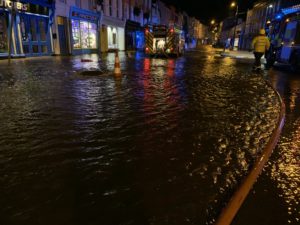
30,000 homes saw power restored before the storm warning was lifted at 5pm on Wednesday while Irish Water continued to work to restore service to 68,000 homes across the country.
A video taken from Fastnet Lighthouse off county Cork showing 9ft swells has gone viral in the wake of the storm.
Former Galway senior hurler PJ Mahoney was killed in a road crash during the storm. He was in his late 70s. Another man, aged in his 30s was injured in the incident. A woman in Cork city fell from a balcony as the storm hit the south coast. Her injuries were not believed to be life-threatening.
While many riverbanks broke, severe flooding was prevented throughout most of the country. However, up to 25 businesses were affected by flooding in Bantry despite extensive efforts by local emergency services.
The Department of Education released a statement thanking “the school community, school staff and parents, and the emergency services for all the support given during Storm Barra.”
Met Éireann predicts the next storm to hit the island, Storm Corrie, will hit between 19-23 December. With the increased frequency in major storms and rising sea levels, Ireland is facing more coastal erosion, and in some areas, residents are calling for sea-walls to be built to protect homes and properties. Councillor Tom Cronin of Ardmore, Co. Waterford told the Guardian newspaper in July that the village urgently needs a special wall to protect local property from the increasing threat of erosion.
Ireland marks 100th anniversary of Treaty
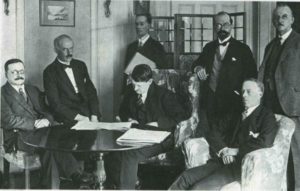
And in the calm before the storm, Ireland marked the centenary of the Anglo-Irish Treaty on Monday.
The signing took place on December 6, 1921. Prime Minister Lloyd George represented Britain while the Irish delegation was led by Arthur Griffith, the Dail Eireann’s minister for foreign affairs. Also in attendance at Downing Street were Michael Collins, Eamon Duggan, Robert Barton, and George Gavan Duffy on the Irish side, and Lord Birkenhead, Austen Chamberlain, Laming Wortington-Evens, Gordon Hewart, Hamar Greenwood, and Winston Churchill for Britain.
The Treaty marked the official end of the War of Independence, set a basis for British withdrawal from the country and the official handing over of power to an Irish government.
It allowed for the establishment of the Irish Free State (but not a Republic) within a year. It also allowed Northern Ireland, which had been created by the Government of Ireland Act 1920, to opt out of the Irish Free State.
The signing of the Treaty took place in the early hours of the morning. The British prime minister had warned the Irish representatives that the war would resume within days if they had failed to sign.
Many in Ireland would later claim that it was signed under duress. President of the Republic, Éamon de Valera, claimed it was invalid.
Sadly, the signing of the Treaty meant Civil War, with the two sides disagreeing on the terms of the treaty. The pro-Treaty provisional government and the anti-Treaty Irish Republican Army were the opposing sides. After almost a year, the war was won by pro-Treaty Free State Forces. The official War of Independence and Civil War were regarded as over but the fighting would continue long after. The issue of Northern Ireland would remain in play going forward.
Various events took place across the country to mark the anniversary. In Galway, a performance at the Spanish Arch by Irish language theatre company, Fíbín sa Taibhdhearc, took place with a “dance-opera-spectacle” called `An Conradh’, meaning ‘The Treaty’. The company said the purpose of the performance was to “express the struggle and the anguish, as well as the hope” felt during negotiations.
Performances also took place at the National Concert Hall, where ANU Productions teamed up with poet Theo Dorgan to stage a recreation of the Treaty debate.
Both the National Archives and the National Museum held ground-breaking exhibits on the Treaty with previously unseen artifacts. Most notably, Dublin Castle hosted a National Archives exhibit which displayed the Treaty itself, for the first time since its signing 100 years ago.
Negative Covid test now required to enter Ireland
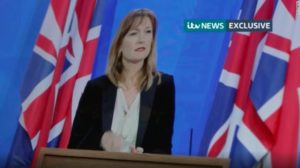
In modern day, the UK has joined Ireland in requiring travelers entering the country to provide a negative Covid test, regardless of vaccination status.
Ireland announced the new restriction beginning on 3 December while the UK followed from 4am on 7 December.
The action is in response to an increase in cases as a result of the Omicron variant. Passengers travelling to Ireland who are fully vaccinated must provide a negative decent within 72 hours of arrival, while those not vaccinated must do so within 48 hours.
In the UK, passengers are required to wait until after landing before taking a PCR test and must isolate for up to 48 hours while awaiting the result.
This news comes as Downing Street faces criticism over leaked audio suggesting a Christmas party took place in December 2020 despite strict restrictions at the time. The outcry from the British public called out the double standards as many people could not visit loved ones in hospital during the time the government’s party allegedly took place. Allegra Stratton, Boris Johnson’s press secretary, was at the heart of the scandal and resigned from her position on Wednesday.
Recipients of Irish Presidential Awards
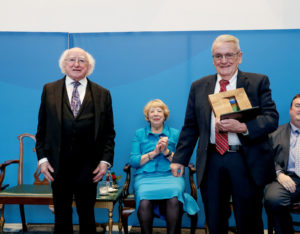
The Irish Presidential Awards took place at Áras an Uachtaráin last week, with broadcasting legend Adrian Flannelly among the recipients.
Flannelly, a native of Mayo, emigrated to America in 1959 at the age of 17. A regular voice on the airwaves for the past 50 years, Flannelly is a well-known member of New York’s Irish American community. He has worked on many projects across the five bouroughs, most notably the Irish Famine Memorial in downtown Manhattan. You can listen to his show here.
Another US-based recipient was Doreen Nanibaa McPaul, attorney general for the Navajo Nation, who is also of Irish decent. McPaul worked as a tribal general for 20 years after graduating from Princeton and has held her current title for two years. Her award was given to her for her charitable work with the Navajo community, who were badly affected by the Covid-19 pandemic.
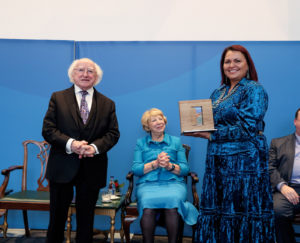
McPaul spoke of her Irish heritage upon receiving the award. “As soon as people learned that the Navajo Nation attorney general was part-Irish, people reached out to me and claimed me as their own and invited me to all these things and celebrated my dual heritage in a way I’ve never experienced before. Literally they put me on the highest pedestal and that’s what this award signifies to me.”
Of the 11 overall recipients honored, four represented the US, including Susan Feldman in the Art, Culture & Sport category Billy Lawless who, like Flannelly, received his award for Irish Community Spirit.
To read about the rest of the recipients click here.
Origin Theatre Company Gala Dinner
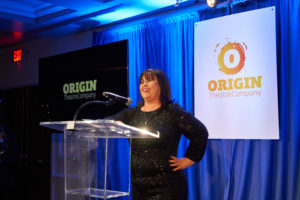
On Tuesday, December 7th, at a gala dinner in Manhattan, Andrea Haughian, who has served as an Origin Theatre board member since 2014, received the Tom Moran Business to Arts Leadership Award, named in memory of the much-admired, longtime leader of Mutual of America, who passed away in 2018.
Haughian, who is the Vice President of Business Development at Invest Northern Ireland’s New York office, was introduced by Deputy Consul General Andrew Byrne who highlighted her many contributions to the Irish American community and her commitment to Northern Ireland. Haughian gave a warm acceptance speech, thanking family and friends. She also spoke fondly of Tom Moran for whom the award was named, detailing his many philanthropic efforts, and citing the support and encouragement that she had received from him over the years.
George C. Heslin, who was presented with Origin’s new Artistic Leadership Award by Loretta Brennan Glucksman, chairman emeritus of the American Ireland Funds, also cited
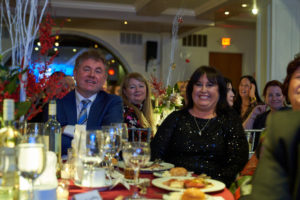
Moran’s generosity in hosting Origin’s first event and many after, at Mutual’s magnificent 35th floor venue. As Origin’s founding artistic director from 2002 to 2020, Heslin introduced the works of countless writers from all over Europe to New York audiences. He became the executive director of the New York Irish Center in October 2020.
Both the honorees received warm video messages from friends and family in Ireland.
Origin’s 1st Irish 2022 festival runs three weeks from January 9 to 31 under the direction of Michael Mellamphy.♦

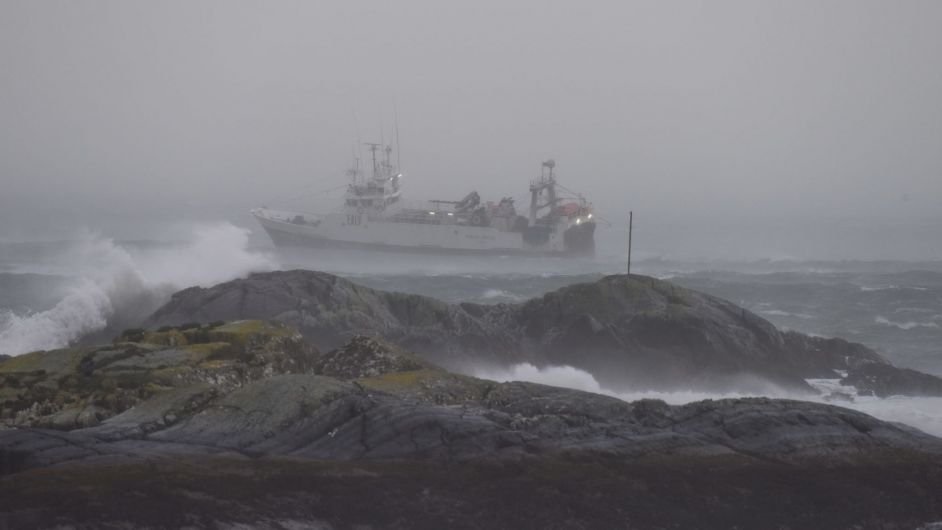
Everyone loves it when individuals come together and share ideas.
Great site, continue the good work!